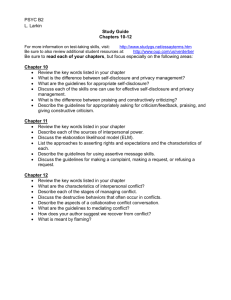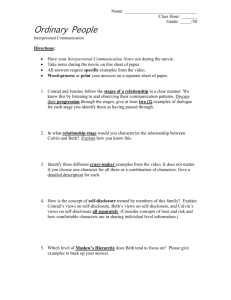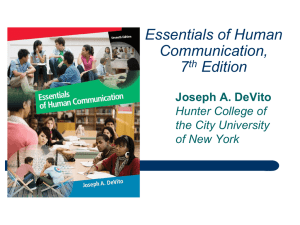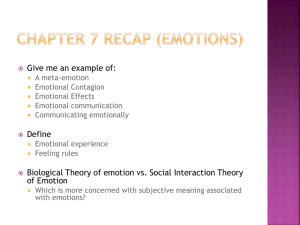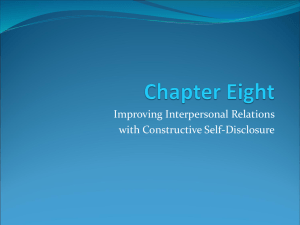File
advertisement
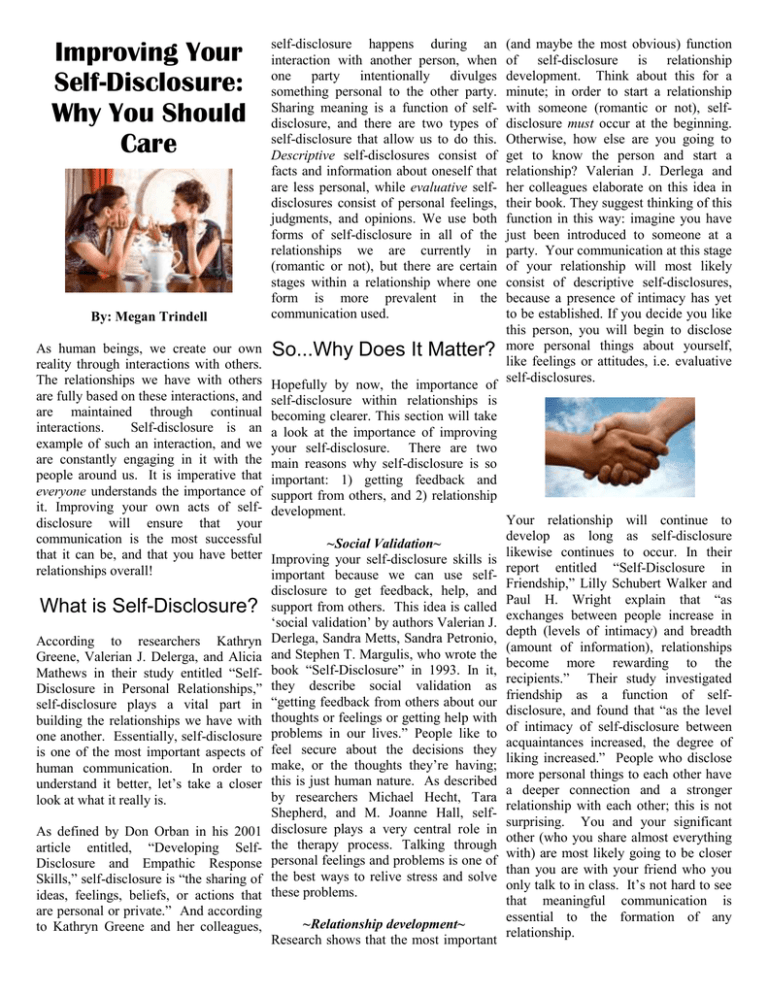
Improving Your Self-Disclosure: Why You Should Care By: Megan Trindell As human beings, we create our own reality through interactions with others. The relationships we have with others are fully based on these interactions, and are maintained through continual interactions. Self-disclosure is an example of such an interaction, and we are constantly engaging in it with the people around us. It is imperative that everyone understands the importance of it. Improving your own acts of selfdisclosure will ensure that your communication is the most successful that it can be, and that you have better relationships overall! What is Self-Disclosure? According to researchers Kathryn Greene, Valerian J. Delerga, and Alicia Mathews in their study entitled “SelfDisclosure in Personal Relationships,” self-disclosure plays a vital part in building the relationships we have with one another. Essentially, self-disclosure is one of the most important aspects of human communication. In order to understand it better, let’s take a closer look at what it really is. As defined by Don Orban in his 2001 article entitled, “Developing SelfDisclosure and Empathic Response Skills,” self-disclosure is “the sharing of ideas, feelings, beliefs, or actions that are personal or private.” And according to Kathryn Greene and her colleagues, self-disclosure happens during an interaction with another person, when one party intentionally divulges something personal to the other party. Sharing meaning is a function of selfdisclosure, and there are two types of self-disclosure that allow us to do this. Descriptive self-disclosures consist of facts and information about oneself that are less personal, while evaluative selfdisclosures consist of personal feelings, judgments, and opinions. We use both forms of self-disclosure in all of the relationships we are currently in (romantic or not), but there are certain stages within a relationship where one form is more prevalent in the communication used. So...Why Does It Matter? Hopefully by now, the importance of self-disclosure within relationships is becoming clearer. This section will take a look at the importance of improving your self-disclosure. There are two main reasons why self-disclosure is so important: 1) getting feedback and support from others, and 2) relationship development. ~Social Validation~ Improving your self-disclosure skills is important because we can use selfdisclosure to get feedback, help, and support from others. This idea is called ‘social validation’ by authors Valerian J. Derlega, Sandra Metts, Sandra Petronio, and Stephen T. Margulis, who wrote the book “Self-Disclosure” in 1993. In it, they describe social validation as “getting feedback from others about our thoughts or feelings or getting help with problems in our lives.” People like to feel secure about the decisions they make, or the thoughts they’re having; this is just human nature. As described by researchers Michael Hecht, Tara Shepherd, and M. Joanne Hall, selfdisclosure plays a very central role in the therapy process. Talking through personal feelings and problems is one of the best ways to relive stress and solve these problems. ~Relationship development~ Research shows that the most important (and maybe the most obvious) function of self-disclosure is relationship development. Think about this for a minute; in order to start a relationship with someone (romantic or not), selfdisclosure must occur at the beginning. Otherwise, how else are you going to get to know the person and start a relationship? Valerian J. Derlega and her colleagues elaborate on this idea in their book. They suggest thinking of this function in this way: imagine you have just been introduced to someone at a party. Your communication at this stage of your relationship will most likely consist of descriptive self-disclosures, because a presence of intimacy has yet to be established. If you decide you like this person, you will begin to disclose more personal things about yourself, like feelings or attitudes, i.e. evaluative self-disclosures. Your relationship will continue to develop as long as self-disclosure likewise continues to occur. In their report entitled “Self-Disclosure in Friendship,” Lilly Schubert Walker and Paul H. Wright explain that “as exchanges between people increase in depth (levels of intimacy) and breadth (amount of information), relationships become more rewarding to the recipients.” Their study investigated friendship as a function of selfdisclosure, and found that “as the level of intimacy of self-disclosure between acquaintances increased, the degree of liking increased.” People who disclose more personal things to each other have a deeper connection and a stronger relationship with each other; this is not surprising. You and your significant other (who you share almost everything with) are most likely going to be closer than you are with your friend who you only talk to in class. It’s not hard to see that meaningful communication is essential to the formation of any relationship. How to Improve As previously stated, self-disclosure is an essential aspect of communication within relationships. Researcher Terry R. Armstrong explains that “good communication is the result of a good balance between self-disclosure and feedback.” It’s clear that it plays a central role in our communication, which is why it is so important to develop good self-disclosure skills. The first step in improving your selfdisclosure deals with the more technical side of this concept. Researcher Don Orban shares that the genuineness of an act of disclosure is important for eliciting the type of response we desire (supportive, caring, etc). This can be enhanced by both the verbal and nonverbal signals within the act of disclosure. He says that to self-disclose effectively, we should use “I” messages to show ownership for our feelings. Furthermore, Orban suggests that selfdisclosure should “continue and move to deeper levels” only if “the receiver is reciprocating in an empathic manner.” Because reciprocation is such an integral part of self-disclosure, it must occur in order to disclosure to continue and also be meaningful. Another step you can take to improve your self-disclosure is to become more flexible in your disclosures. This idea is elaborated upon by researchers Gordon J. Chelune and Jorge L. Figueroa in their article in the Western Journal of Speech Communication. They explain that disclosure flexibility is the “ability of an individual to adequately differentiate various situational and interpersonal cues and adapt his or her disclosures accordingly.” According to their work, the ability to do so indicates very positive mental functioning. Being conscious of your situation and environment is absolutely crucial to effective self-disclosure. Be aware of your surroundings and consider the following; are you in a private location, is there enough time available to talk, does your disclosure fit well into the flow of conversation? As Michael Hecht and his colleagues explain, “the importance of self-disclosure as a communication construct is reflected in the desired response it achieves.” Selfdisclosure works the way it does (getting feedback, developing relationships, etc.) because it is entirely based on an exchange of information between two people. If your situation and environment are not conducive to effective disclosure, then you may want to reconsider disclosing and save it for a time when your receiver will be able to better respond to your thoughts. The next step in improving your selfdisclosure is realizing the responsibility you are taking on when deciding to disclose. By consciously disclosing to another person, you must be willing to provide the same support that they are providing for you. Individuals in a relationship (romantic or not), “are likely to exchange roles of discloser and recipient within a conversation and across time as they coordinate their needs and expectations about disclosing or listening,” according to Kathryn Green and her colleagues. Anyone who engages in self-disclosure must be willing to abide by this change in roles among partners. Lastly, one more step that should be taken to improve your self-disclosure is to seek out an appropriate acquaintance with whom to disclose. Being able to discern who will respond to your selfdisclosure in the most positive way is a skill that everyone should learn. For example, while it’s perfectly fine for you to discuss the problems you and your boyfriend are having with your best friend, that topic probably isn’t the best thing to bring up with someone you just met at a party. As researcher Don Orban puts it, “for self-disclosure to be appropriate, there should be a perception of an acceptable level of trust, caring, and commitment with the person who receives the disclosure.” In order for you to get the most out of your selfdisclosure, you should feel comfortable disclosing personal thoughts with them. Self-disclosure is a vital part of human communication, and helps us get advice from those we trust with our disclosures, as well as develop relationships with new people. Because it plays such a huge role in our lives, it is essential that everyone understands how they can improve their own acts of disclosure and enhance their communication skills and relationships with others! About the Author Megan Trindell is a junior Interpersonal Communication Major and has a minor in Spanish. She enjoys photography, playing volleyball, and applying material from her interpersonal communication class to real life! References Armstrong, T. R. (2006). Revisiting the Johari Window: Improving communications through selfdisclosure and feedback. Human Development, 27(2), 10-14. Chelune, G. J., & Figueroa, J. L. (1981). Self-Disclosure flexibility, neuroticism, and effective interpersonal communication. The Western Journal of Speech Communication, (45), 27-37. Derlega, V. J., Metts, S., Petronio, S., & Margulis, S. T. (1993). Self-Disclosure. Newbury Park, CA: Sage. Greene, K., Delerga, V. J., & Mathews, A. (2006). SlefDisclosure in personal relationships. The Cambridge Handbook of Personal Relationships, 409-427. Hecht, M., Shepherd, T., & Hall, M. J. (1979). Multivariate indices of the effects of self-disclosure. The Western Journal of Speech Communication, (43), 235-245. Orban, D. (2001). Developing self-disclosure and empathic response skills. Communication Teacher, 15(3), 46. Walker, L. S., & Wright, P. H. (1976). Self-Disclosure in Friendship. Perceptual and Motor Skills, (42), 735-742.
